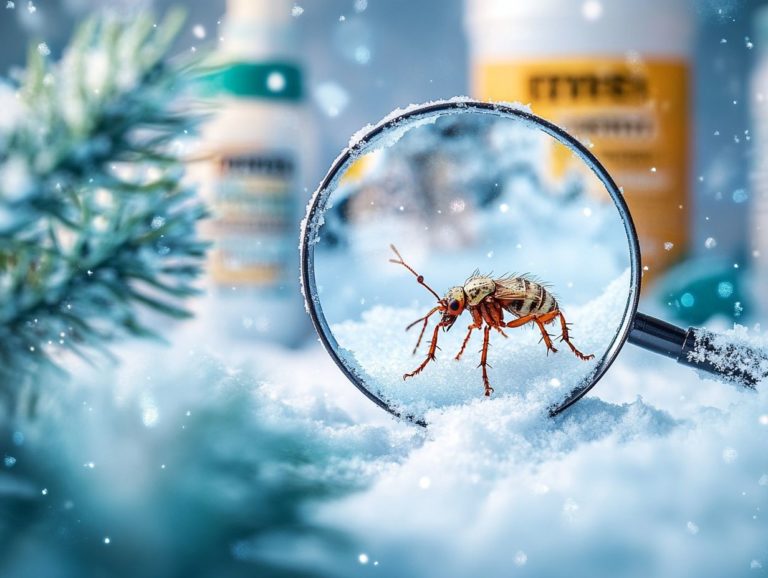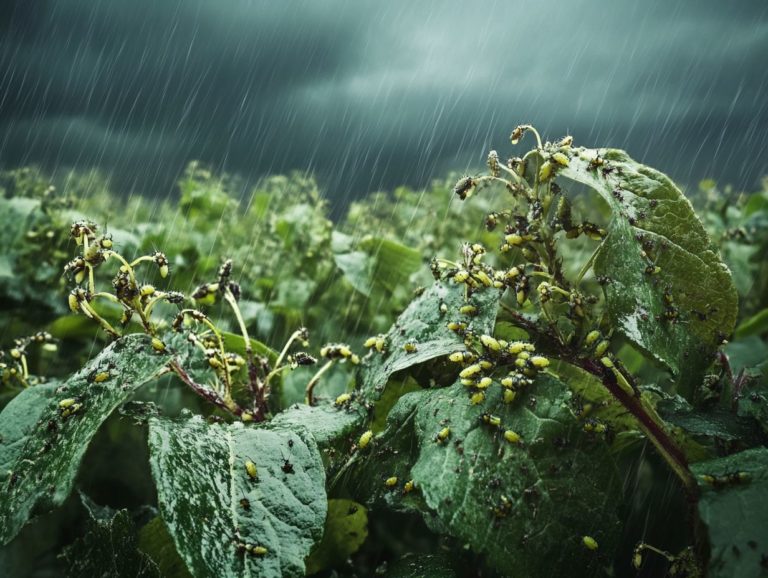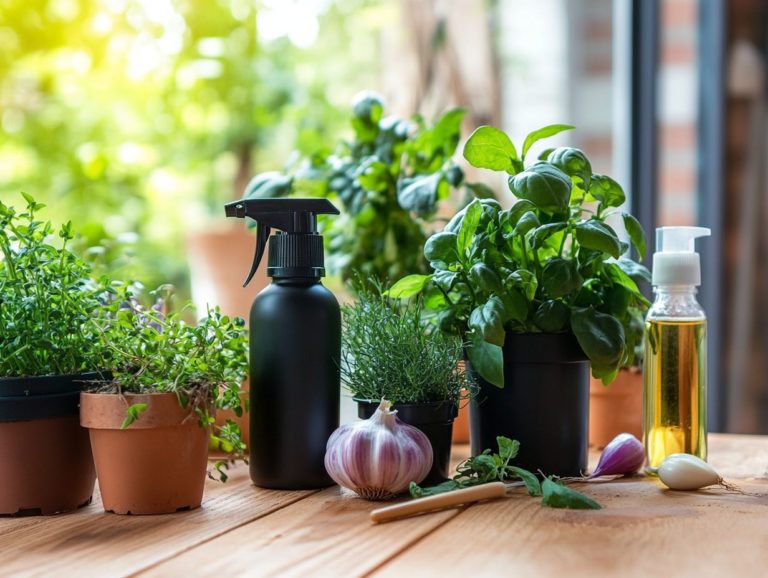Choosing Eco-Friendly Pesticides for Winter
As winter approaches, the fight against pests doesn’t simply pause; it transforms into exciting new strategies!
You may find that traditional pesticides often come with a substantial environmental cost. This is why many are turning to greener solutions. This article delves into the importance of choosing eco-friendly pesticides and highlights how they impact the ecosystem compared to conventional options.
It covers the various types available and the key factors to consider for both effectiveness and safety. Discover non-chemical methods to keep your home pest-free during the colder months!
By embracing a healthier, more sustainable approach to pest control, you re making a choice that benefits both your home and the planet.
Contents
- Key Takeaways:
- The Importance of Choosing Eco-Friendly Pesticides
- Types of Eco-Friendly Pesticides
- Factors to Consider When Choosing Eco-Friendly Pesticides
- Using Eco-Friendly Pesticides in Winter
- Tips for Applying Eco-Friendly Pesticides
- Alternative Methods for Winter Pest Control
- Frequently Asked Questions
- What are eco-friendly pesticides?
- Why should I choose eco-friendly pesticides for winter?
- What are some examples of eco-friendly pesticides for winter?
- How do I know if a pesticide is eco-friendly?
- Are eco-friendly pesticides as effective as traditional pesticides?
- How can I ensure that I am using eco-friendly pesticides properly?
Key Takeaways:

- Choose eco-friendly pesticides to reduce harm to the environment and protect beneficial insects.
- Natural and organic options, as well as biopesticides, are effective and safe alternatives to traditional pesticides.
- Consider effectiveness, targeted pests, environmental impact, and safety when selecting eco-friendly pesticides for winter pest control.
The Importance of Choosing Eco-Friendly Pesticides
In today s world, the importance of selecting eco-friendly pesticides is paramount. Traditional chemical insecticides have been linked to detrimental effects on the environment, jeopardizing biodiversity and harming beneficial insects that play vital roles in our gardens.
By embracing eco-friendly pest management practices, you can foster a thriving garden ecology while minimizing environmental damage.
These eco-friendly solutions not only safeguard your garden but also enhance annual food production and help maintain the quality of air and water.
Impact of Traditional Pesticides on the Environment
Traditional pesticides, especially synthetic ones, can wreak havoc on the environment, affecting air quality, water quality, and the overall health of ecosystems.
When these chemicals enter agricultural practices, they often lead to runoff that contaminates nearby water sources, creating toxic environments for aquatic life. The volatility of some synthetic pesticides can compromise air quality, posing health risks not only to you but also to wildlife.
Beneficial insects, such as pollinators and natural pest predators, are at high risk; exposure to these chemicals can drastically reduce their populations, which in turn diminishes garden productivity and biodiversity.
Given this reality, embracing eco-friendly alternatives and a combination of different methods to control pests safely becomes not just a choice it s a necessity for sustainable gardening and agricultural practices.
Types of Eco-Friendly Pesticides
You have access to a range of eco-friendly pesticides that deliver effective natural insecticide solutions. By emphasizing sustainable practices, you can engage in holistic pest management while utilizing organic fertilizers and compost.
This approach not only protects your plants but also nurtures a thriving garden ecology.
Natural and Organic Options
Natural and organic options for pest control encompass a range of organic gardening techniques and fertilizers that deter pests while enriching soil health and fortifying your plants.
By integrating these methods into your gardening routine, you can cultivate a thriving ecosystem that significantly reduces your dependence on synthetic chemicals. Techniques like companion planting attract beneficial insects and foster a balanced environment where natural predators can flourish.
Utilizing neem oil or diatomaceous earth allows you to manage unwanted pests effectively while ensuring the safety of other wildlife.
Composting enriches your soil with essential nutrients, promoting deeper root systems that enhance your plants’ resilience against diseases and pest invasions. These sustainable practices lead to healthier gardens and diminish the likelihood of future pest problems.
Start adopting eco-friendly practices today to make a positive impact on your environment!
Biopesticides

Biopesticides represent a modern approach for pest control. They leverage natural organisms like B. bassiana to manage pest populations while preserving the balance of beneficial insects.
These environmentally-friendly alternatives utilize bacteria, fungi, and plant materials, specifically targeting pests without disrupting the ecosystem. For example, Bacillus thuringiensis effectively tackles caterpillars while minimizing impacts on non-target species. Neem oil, extracted from neem tree seeds, serves as a natural insect repellent while supporting diverse plant health.
By prioritizing biological control methods, you protect your crops and play a crucial role in preserving pollinators and predatory insects, essential for a thriving environment.
Factors to Consider When Choosing Eco-Friendly Pesticides
When selecting eco-friendly pesticides, consider several key factors. Evaluate their effectiveness against target pests, assess their environmental impact, and ensure they are safe for humans and beneficial insects.
Making informed choices contributes to a healthier ecosystem and promotes a sustainable approach to pest management.
Effectiveness and Targeted Pests
The effectiveness of eco-friendly pesticides varies by product and targeted pests. This is why seasonal pest management is crucial for optimal results.
When evaluating performance, consider key factors such as active ingredients, application methods, and the lifecycle stage of pests. For instance, some products work well against aphids during their nymph stage but may be ineffective once they mature.
By observing pest activity throughout the seasons, you can time applications perfectly to enhance control measures.
Incorporating monitoring techniques like sticky traps or visual inspections helps identify pest presence and population density. This ensures your eco-friendly options are deployed strategically and efficiently, aligning with environmentally responsible practices.
Environmental Impact and Safety
Understanding the environmental impact and safety of eco-friendly pesticides is essential, especially when compared to the risks of chemical insecticides.
The debate between these pest control methods is increasingly relevant as more individuals and agricultural practices pursue sustainable solutions. Eco-friendly options often come from natural substances, minimizing chemical runoff and encouraging biodiversity in affected areas.
By implementing best practices such as proper application techniques and timing you can help mitigate potential harm. Following safety protocols, like wearing protective gear and reading labels, ensures these greener alternatives maintain their advantages without compromising ecosystem health.
By grasping these nuances, you can take charge now and make informed choices that align with your environmental values while effectively managing pest populations.
Using Eco-Friendly Pesticides in Winter
Using eco-friendly pesticides in winter presents distinct challenges for seasonal pest management. However, by choosing the right pesticides for cold climates, you can navigate these hurdles effectively and preserve your garden’s ecology.
Challenges and Solutions

When you implement eco-friendly pesticides in winter, you may face challenges related to pest identification strategies and the effectiveness of products in colder conditions. Exploring organic pest solutions for cold climates can provide valuable insights.
The chilly weather often leads to a decline in pest activity, making it trickier to spot pesky intruders lurking in garden corners or beneath the soil.
Many natural pesticides lose their strength in cold weather, creating another hurdle for eco-conscious gardeners. Learning how to deal with insects in winter gardens can help you overcome these challenges.
To adapt, consider refining your pest identification techniques. Tools like magnifying glasses can help you closely examine plants for signs of winter pests.
Exploring effective eco-friendly pesticide options, such as neem oil and diatomaceous earth, can significantly boost your pest management efforts during these demanding months, especially when considering the best timing for pest control in winter.
Tips for Applying Eco-Friendly Pesticides
To effectively apply eco-friendly pesticides, you must follow proper application techniques for maximum efficacy.
Implementing specific action steps for pest control and maintaining continuous monitoring of pest activity is crucial.
This approach enhances effectiveness while promoting a sustainable environment.
Proper Application Techniques
Using proper application techniques is essential in eco-friendly pest management. This ensures you accurately target and control the intended pests.
Understanding the right mixing ratios tailored to specific pests and products is vital; an improper mixture can lead to disappointing results.
Timing is also important; some pests are particularly vulnerable during certain life stages or under specific weather conditions.
By employing methods like spot treatments or targeted sprays, you can minimize exposure to beneficial organisms and reduce overall pesticide usage.
Accurate pest identification is vital, as mixed-species populations may require different strategies.
This highlights the importance of an integrated approach that combines keen observation with precise application for truly effective outcomes.
Alternative Methods for Winter Pest Control
In addition to eco-friendly pesticides, you can explore a range of non-chemical methods for winter pest control, including using natural fertilizers in winter.
These strategies not only enhance your seasonal pest management but also foster a thriving garden ecology.
Non-Chemical Approaches
Non-chemical approaches to pest control emphasize the importance of beneficial insects and natural methods, especially when preventing indoor pests during winter to keep your garden resilient throughout the winter months.
You can attract predatory species like ladybugs and lacewings, which feast on troublesome pests such as aphids.
Incorporating crop rotation and companion planting helps cultivate a diverse ecosystem that supports natural pest deterrents.
Using techniques like physical barriers think row covers or introducing nematodes, reduces pest populations while promoting a balanced environment.
These practices enhance soil health and boost biodiversity, resulting in a flourishing garden capable of withstanding various stresses.
By nurturing nature s allies, you contribute to sustainability and ecological harmony within your garden.
Frequently Asked Questions

What are eco-friendly pesticides?
Eco-friendly pesticides are made from natural ingredients and are not harmful to the environment or human health.
They effectively target pests without harming beneficial insects, animals, or the ecosystem.
Why should I choose eco-friendly pesticides for winter?
Choosing eco-friendly pesticides for winter protects the environment and reduces harmful chemicals contaminating water sources or harming wildlife. For more insights, check out how to use natural pest control in winter.
This choice promotes a healthier and safer living environment for you and your family.
What are some examples of eco-friendly pesticides for winter?
Examples include neem oil, diatomaceous earth, and insecticidal soap.
These products are made from natural ingredients and effectively control pests without harming the environment or human health.
Start using these eco-friendly pesticides today for a healthier garden!
How do I know if a pesticide is eco-friendly?
To find eco-friendly pesticides, look for labels that say “organic,” “natural,” or “eco-friendly.” These products often use ingredients from nature and are approved by the Environmental Protection Agency. Additionally, consider protecting your garden from winter pests to ensure a healthy garden year-round.
Are eco-friendly pesticides as effective as traditional pesticides?
Yes, they can work just as well! They might need to be applied several times and may take a bit longer to show results.
Always follow the label instructions for the best outcome.
How can I ensure that I am using eco-friendly pesticides properly?
Read the label carefully before using eco-friendly pesticides. Make sure to use the right amount and keep them stored safely away from children and pets.






